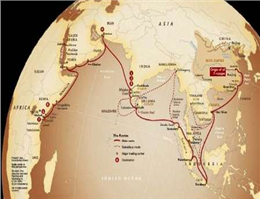India and Russia Could Develop Their Own “One Belt”
EVERYONE talks about China’s One Belt, One Road initiative, linking east and west by road, rail, maritime transport and other means. But much less frequently do people talk about the fact that Russia and India could also have their own version of OBOR.

According to MANA, The OBOR system is changing by the day and countries should strive to position themselves in it,” said Rotterdam's Erasmus University’s Professor of Maritime Economics and Logistics Hercules Haralambides.
“The equally impressive plans of Russia and India should not be overlooked,” according to a presentation sent to Lloyd’s List by Prof Haralambides.
One of India’s strategic objectives is to link up with Russia’s North-South Transport Corridor, while another is to connect to the Mediterranean through Kuwait, Iraq, Syria and Lebanon, according to the presentation, first shown at TOC Europe earlier this week.
India’s investment in Iran’s port of Chabahar aims to bypass Pakistan’s port of Gwadar, which is being developed by China.
The potential route from Mumbai to Chabahar, then to Tehran and through to Baku and finally Moscow, could work out 30% cheaper and 40% shorter than the alternative, and perhaps more important is that it is less vulnerable to possible disruptions.
The alternative is from Mumbai to the Suez Canal, to Gibraltar, to the English Channel and to St Petersburg, and then on to Moscow.
Middle East Gulf ports are not currently part of the OBOR system, but especially for ports in the upper Gulf such as Umm Qasr in Iraq and Imam Khomeini in Iran, they could constitute a land alternative to the Suez Canal linking eventually to the Mediterranean.
“A port system such as this could and would serve the vast hinterlands of Iraq, Iran, Turkey, all the way up to Moscow, thus connecting to OBOR through Russia’s North-South Transport Corridor," said the professor.
Meanwhile, Europe should take advantage of filling the gap vacated by the US in trade with China, said Prof Haralambides.
US President Donald Trump’s administration aims to withdraw from the TransPacific Partnership and may well end up retreating from the North American Free Trade Agreement.
With lots of investments in African ports, and a sizeable move into European assets, China could “soon be looking at the Pacific Ocean, expanding OBOR to an around the world network,” the professor said.